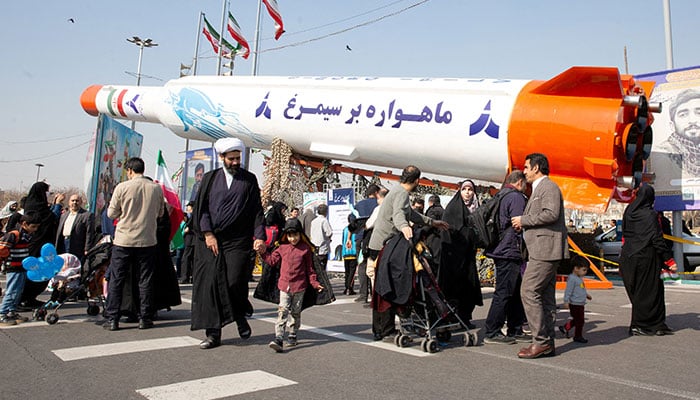Iran says new research satellite launched into orbit
Country advances aerospace activities amid warnings from US, western govts against launches
TEHRAN: Iran on Saturday blasted a new research satellite into orbit, state media said, in the latest such development for an aerospace programme that has long faced Western criticism.
"The Chamran-1 research satellite was successfully launched and put into orbit by the Ghaem-100 carrier," state television said.
The satellite, which weighs around 60 kilogrammes (132 pounds), is designed to test hardware and software systems for orbital manoeuvre technology, the TV report said.
The device was designed and built by Iranian Electronics Industries affiliated with the defence ministry, state TV said.
Western governments including the United States have repeatedly warned Iran against such launches, saying the same technology can be used for ballistic missiles, including ones designed to deliver a nuclear warhead.
Iran has countered that it is not seeking nuclear weapons and that its satellite and rocket launches are for civil or defence purposes only.
The Ghaem-100 rocket which carried the latest satellite is manufactured by the aerospace organisation of Iran's Revolutionary Guard Corps, an arm of the military.
The carrier is the country's first three-stage solid-fuel satellite launcher, and official media reported its use in January to send a satellite for the first time into an orbit above 500 kilometres (310 miles).
Iran has for years been advancing its aerospace activities, insisting they are peaceful and in accordance with United Nations Security Council resolutions.
In February, Russia put into orbit an Iranian remote sensing and imaging satellite, drawing condemnation from the United States.
At the time, Iran's telecommunications minister said Iran had carried out a dozen satellite launches over the previous two years.
Iran in January said it simultaneously sent three satellites into orbit, nearly a week after the launch of a research satellite by the Guards.
The Islamic republic has struggled with several satellite launch failures in the past.
Iran has suffered years of crippling Western sanctions, especially after its arch-foe the United States, under then-president Donald Trump, in 2018 unilaterally abandoned a landmark nuclear deal between Tehran and major powers.
Iran on Thursday summoned four European ambassadors after they imposed new sanctions over its alleged supply of ballistic missiles to Russia for use in Ukraine, which Tehran denies.
-
SpaceX cleared for NASA Crew-12 launch after Falcon 9 review
-
Is dark matter real? New theory proposes it could be gravity behaving strangely
-
Shanghai Fusion ‘Artificial Sun’ achieves groundbreaking results with plasma control record
-
Polar vortex ‘exceptional’ disruption: Rare shift signals extreme February winter
-
Netherlands repatriates 3500-year-old Egyptian sculpture looted during Arab Spring
-
Archaeologists recreate 3,500-year-old Egyptian perfumes for modern museums
-
Smartphones in orbit? NASA’s Crew-12 and Artemis II missions to use latest mobile tech
-
Rare deep-sea discovery: ‘School bus-size’ phantom jellyfish spotted in Argentina












